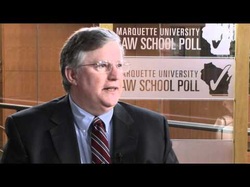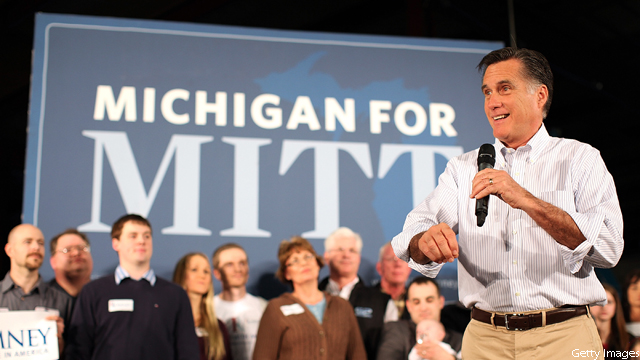Old school journalism may be dying, but Mike Gousha is thriving as the elite open-minded journalist in Wisconsin.
After years of being a political reporter and anchor at the Milwaukee NBC network, Gousha said he “grew disillusioned,” and announced his resignation in 2006. Soon there after, Marquette Law School Dean Joe Kearney approached Gousha about continuing with serious journalism. Gousha accepted and in 2007 began his time as a distinguished fellow in law and policy.
Gousha informed our class that this switch positioned him to be the moderator for serious, thoughtful and challenging discourse within the region. His On The Issues with Mike Gousha invites newsmakers and policy shapers to discuss topics pertaining not only to the city of Milwaukee but also to Wisconsin as a state. He has hosted everyone from Rev. Scott R. Pilzrz, S.J, President of Marquette University to Rep. Paul Ryan of Wisconsin. This has broken ground for numerous political debates, in what Gousha hopes to “be a force for public good.”
In 2008, Gousha returned to anchoring television when he began producing a Sunday morning show called Up Front with Mike Gousha. Gousha explained it as a forum to “talk about the issues of the day—not necessarily a place for screaming and yelling.”
Up Front and On The Issues have given space for smart and interesting conversation and discourse in a truly bipartisan way. The synergy between the two forums has allowed for Gousha to focus on the specific goal of thoughtful and civil conversation. Civil debate, Gousha commented, has become lost art in current television news, but he believes there still needs to be a place for it in current journalism.
“I don’t think my job is to be a prosecutor,” Gousha said. “Facts that are shaped to form a political philosophy—that troubles me. These cable news anchors are the new school political pundits and are not practicing journalism.”
Indeed, Gousha’s point of view is refreshing in a world of 24-hour cable news networks dominating the story, with politicians trying to appease them and cater to their critiques. Blurring the line between entertainment and news is dangerous and ineffective—and affirming people, as Gousha said, is not informing them.
Gousha’s non-partisan views were inspiring, and I left Thursday’s class feeling pumped up about the still evident good in the field. After a weekend, however, and a tad bit of cynicism, I am distraught that while experienced Gousha could make a change in presenting issues, novice journalists do not have such a luxury. We live in a polarized time—which is troubling. Even more troubling: if we don’t take a side, we could easily be pushed aside.
After years of being a political reporter and anchor at the Milwaukee NBC network, Gousha said he “grew disillusioned,” and announced his resignation in 2006. Soon there after, Marquette Law School Dean Joe Kearney approached Gousha about continuing with serious journalism. Gousha accepted and in 2007 began his time as a distinguished fellow in law and policy.
Gousha informed our class that this switch positioned him to be the moderator for serious, thoughtful and challenging discourse within the region. His On The Issues with Mike Gousha invites newsmakers and policy shapers to discuss topics pertaining not only to the city of Milwaukee but also to Wisconsin as a state. He has hosted everyone from Rev. Scott R. Pilzrz, S.J, President of Marquette University to Rep. Paul Ryan of Wisconsin. This has broken ground for numerous political debates, in what Gousha hopes to “be a force for public good.”
In 2008, Gousha returned to anchoring television when he began producing a Sunday morning show called Up Front with Mike Gousha. Gousha explained it as a forum to “talk about the issues of the day—not necessarily a place for screaming and yelling.”
Up Front and On The Issues have given space for smart and interesting conversation and discourse in a truly bipartisan way. The synergy between the two forums has allowed for Gousha to focus on the specific goal of thoughtful and civil conversation. Civil debate, Gousha commented, has become lost art in current television news, but he believes there still needs to be a place for it in current journalism.
“I don’t think my job is to be a prosecutor,” Gousha said. “Facts that are shaped to form a political philosophy—that troubles me. These cable news anchors are the new school political pundits and are not practicing journalism.”
Indeed, Gousha’s point of view is refreshing in a world of 24-hour cable news networks dominating the story, with politicians trying to appease them and cater to their critiques. Blurring the line between entertainment and news is dangerous and ineffective—and affirming people, as Gousha said, is not informing them.
Gousha’s non-partisan views were inspiring, and I left Thursday’s class feeling pumped up about the still evident good in the field. After a weekend, however, and a tad bit of cynicism, I am distraught that while experienced Gousha could make a change in presenting issues, novice journalists do not have such a luxury. We live in a polarized time—which is troubling. Even more troubling: if we don’t take a side, we could easily be pushed aside.



 RSS Feed
RSS Feed